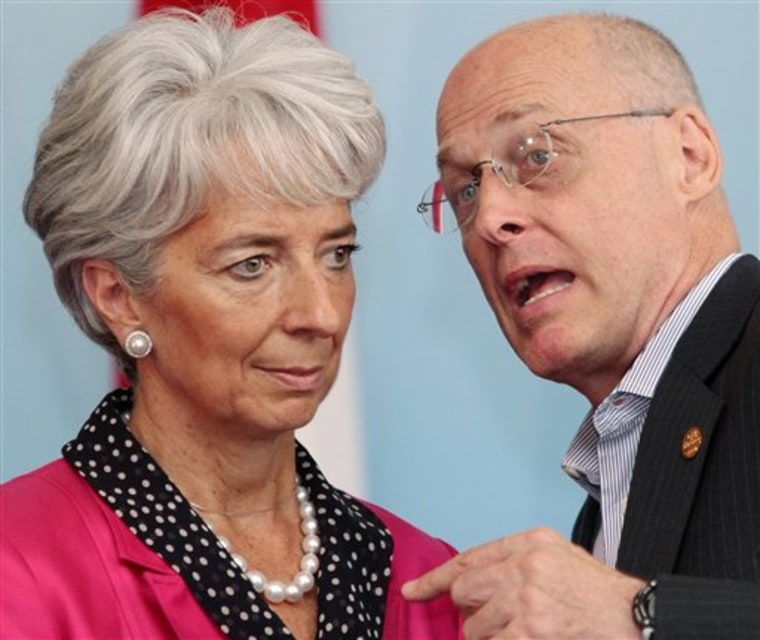Finance ministers from the Group of Eight industrialized nations urged oil producers Saturday to boost output to help stabilize record-high oil and food prices, calling the situation a serious threat to global economic growth.
The world economy now faces "headwinds" because of the recent rise in prices, the G-8 ministers said in a joint statement at the conclusion of two days of talks in Osaka in western Japan.
"Elevated commodity prices, especially of oil and food, pose a serious challenge to stable growth worldwide, have serious implications for the most vulnerable and may increase global inflationary pressure," the statement said.
The fundamental factor driving oil prices is the imbalance between rising global demand and supply constraints, the ministers said. They added that geopolitical and financial factors also play a role — a reflection of some ministers' view that speculative trading in oil markets is pushing up prices.
U.S. Treasury Secretary Henry Paulson insisted that the problem stems primarily from tight supplies and warned against embracing "short-term solutions."
Noting that oil prices have jumped fivefold since 2002, Paulson in a statement called on countries to let markets work and reduce reliance on subsidies. He pressed oil-producing countries to allow more investment in oil exploration and production.
"I think there's a danger if people say, 'Oh, it's the speculators,'" Paulson told reporters after meeting with his G-8 counterparts. "We don't want to misdiagnose the problem. And if you look at the problem, I think it's pretty clear. We have not had an increase in production capacity in oil for the last 10 years."
British Chancellor Alistair Darling said: "What we need to do, as a matter of urgency, is to increase supplies."
Waiting for September
The current president of the Organization of Petroleum Exporting Countries, Chakib Khelil, has said that the cartel will make no new decision on production levels until its Sept. 9 meeting in Vienna.
But The New York Times and the Middle East Economic Survey, an industry publication, have reported that Saudi Arabia is set to raise production by about 500,000 barrels per day. The increase would bring Saudi Arabia's oil production to 10 million barrels a day, the country's highest ever.
Saudi Arabia's oil minister will address those reports on Sunday, adviser Ibrahim al-Muhanna said Saturday.
Other G-8 members, particularly France, Germany and Italy, place greater blame on speculators.
Italian Finance Minister Giulio Tremonti said "enormous" speculation is behind the rising energy prices. He has proposed an increase in margins needed to trade oil futures contracts.
Japanese Finance Minister Fukushiro Nukaga, chair of the G-8 meeting, downplayed any differences among members, saying they simply "don't yet have a full understanding of what is actually happening."
To help find out, the ministers called on national authorities to examine commodity futures markets and take "appropriate measures as needed." They also asked the International Monetary Fund and the International Energy Agency for a report later this year on the factors behind surging oil and commodity prices.
The agenda for the G-8 talks also included troubled financial markets, private-sector-led development in Africa and global warming. The ministers said they welcome and support a pair of new funds — including a $10-billion clean technology fund — to help developing countries fight global warming.
U.S. dollar eyed
The Bush administration has asked Congress for $2 billion for the fund, which would help developing countries such as China and India finance the costs of adopting less-polluting technologies. Paulson said the U.S. would also host a pledge event.
Britain has offered about $1.56 billion, and Japanese Prime Minister Yasuo Fukuda announced this past week a pledge of up to $1.2 billion.
Not on the official agenda, but a hot topic nonetheless on the G-8 sidelines, was the U.S. dollar.
With central bankers absent in Osaka, currencies were omitted from the joint statement. But Canadian Finance Minister Jim Flaherty acknowledged that ministers discussed the issue informally.
The U.S. dollar's weakness is considered a major culprit behind pricier oil, while European countries dealing with a stronger euro fret that their goods have become less competitive. A depreciated dollar also saps major exporters like Japan by eroding their repatriated earnings.
Flaherty told reporters Saturday that Canada has taken a heavy beating from the weak U.S. dollar, which has hurt Canadian manufacturing exports to the U.S.
"We've borne one-third of the brunt of the depreciation of the U.S. currency" due to the size of Canada's trade with its southern neighbor, he said.
Hit by economic woes
After hitting recent record lows against the euro, the dollar strengthened after Paulson warned earlier this week that he isn't ruling out intervening in currency markets. Paulson reiterated Saturday that "a strong dollar is in our nation's interest."
The ministers from the G-8 nations — Britain, Canada, France, Germany, Italy, Japan, Russia and the U.S. — noted some improvement lately in financial markets, slammed by the credit crunch and U.S. housing woes since last year. But problems still remain, they said.
"The world economy continues to face uncertainty and downside risks persist," their statement said. "We will remain vigilant and will continue to take appropriate actions, individually and collectively, in order to secure stability and growth in our economies and globally."
Next up on the G-8 schedule is a July 7-9 leaders' summit in northern Japan.
